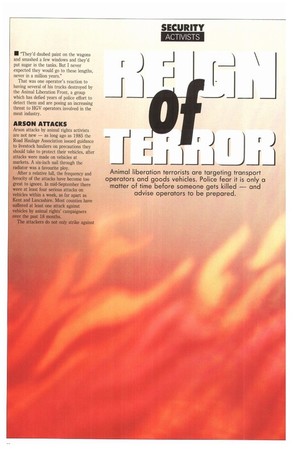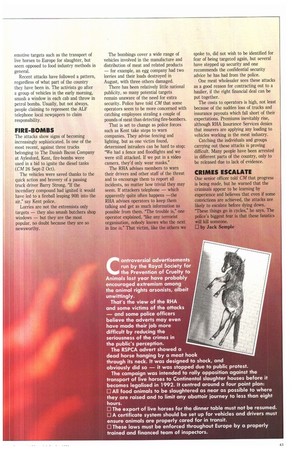• "They'd daubed paint on the wagons and smashed a
Page 44

Page 45

If you've noticed an error in this article please click here to report it so we can fix it.
few windows and they'd put sugar in the tanks. But I never expected they would go to these lengths, never in a million years."
That was one operator's reaction to having several of his trucks destroyed by the Animal Liberation Front, a group which has defied years of police effort to detect them and are posing an increasing threat to HGV operators involved in the meat industry.
ARSON ATTACKS
Arson attacks by animal rights activists are not new — as long ago as 1985 the Road Haulage Association issued guidance to livestock hauliers on precautions they should take to protect their vehicles, after attacks were made on vehicles at markets. A six-inch nail through the radiator was a favourite ploy.
After a relative lull, the frequency and ferocity of the attacks have become too great to ignore. In mid-September there were at least four serious attacks on vehicles within a week, as far apart as Kent and Lancashire. Most counties have suffered at least one attack against vehicles by animal rights' campaigners over the past 18 months.
The attackers do not only strike against emotive targets such as the transport of live horses to Europe for slaughter, but seem opposed to food industry methods in general.
Recent attacks have followed a pattern, regardless of what part of the country they have been in. The activists go after a group of vehicles in the early morning, smash a window in each cab and throw in petrol bombs. Usually, but not always, people claiming to represent the ALF telephone local newpapers to claim responsibility.
FIRE-BOMBS
The attacks show signs of becoming increasingly sophisticated. In one of the most recent, against three trucks belonging to The Danish Bacon Company at Aylesford, Kent, fire-bombs were used in a bid to ignite the diesel tanks (CM 26 Sept-2 Oct).
The vehicles were saved thanks to the quick action and bravery of a passing truck driver Barry Strong. "If the incendiary compound had ignited it would have led to a fireball leaping 9Gft into the air," say Kent police.
Lorries are not the extremists only targets — they also smash butchers shop windows — but they are the most popular, no doubt because they are so newsworthy. The bombings cover a wide range of vehicles involved in the manufacture and distribution of meat and related products — for example, an egg company had two lorries and their loads destroyed in August, with three others damaged.
There has been relatively little national publicity, so many potential targets remain unaware of the need for extra security. Police have told CM that some operators seem to be more concerned with catching employees stealing a couple of pounds of meat than detecting fire-bombers.
That is set to change as police forces such as Kent take steps to warn companies. They advise fencing and lighting, but as one victim found, determined intruders can be hard to stop: "We had a fence and floodlights and we were still attacked. If we put in a video camera, they'd only wear masks."
The RHA advises members to warn their drivers and other staff of the threat and to encourage them to report all incidents, no matter how trivial they may seem. If attackers telephone — which apparently quite often happens —the RHA advises operators to keep them talking and get as much information as possible from them. "The trouble is," one operator explained, like any terrorist organisation, nobody knows who the next in line is." That victim, like the others we spoke to, did not wish to be identified for fear of being targeted again, but several have stepped up security and one recommends the confidential security advice he has had from the police.
One meat wholesaler sees these attacks as a good reason for contracting out to a haulier, if the right financial deal can be put together.
The costs to operators is high, not least because of the sudden loss of trucks and insurance payouts which fall short of their expectations. Premiums inevitably rise, although RHA Insurance Services denies that insurers are applying any loading to vehicles working in the meat industry.
Catching the individuals and groups carrying out these attacks is proving difficult. Many people have been arrested in different parts of the country, only to be released due to lack of evidence,
CRIMES ESCALATE
One senior officer told CM that progress is being made, but he warned that the criminals appear to be learning by experience and believes that even if some convictions are achieved, the attacks are likely to escalate before dying down. "These things go in cycles," he says. The police's biggest fear is that these fanatics will kill someone.
0 by Jack Semple
















































































































